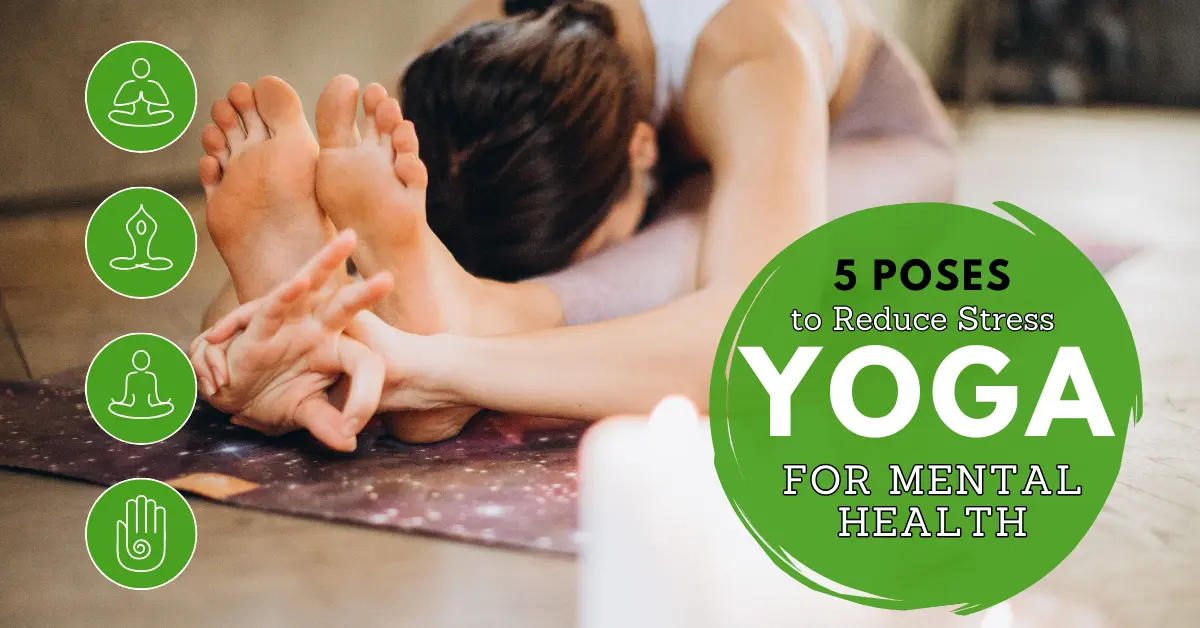
Yoga for Mental Health: 5 Poses to Reduce Stress
- 114
- 0
- 0
Yoga for mental health is a simple and effective way to improve cognitive health. It helps to reduce stress, anxiety, and depression by calming the mind and relaxing the body. Regular practice of yoga promotes better sleep, boosts mood, and increases focus. Breathing exercises in yoga help clear the mind, while poses improve blood flow, releasing tension and refreshing the mind. Yoga also encourages mindfulness, allowing you to stay in the present moment. Just a few minutes of daily yoga can bring peace, clarity, and a positive outlook, supporting overall mental well-being.
Yoga for Mental Health: 5 Poses to Reduce Stress
Getting started with yoga can make a big difference in managing daily stress and improving mental health. As more people deal with anxiety and tension in their busy lives, simple yoga poses offer a practical way to feel calmer and more balanced. Let’s look at 5 effective yoga poses that will be yoga for mental health & that can help reduce stress and support better mental wellbeing.
Why Yoga Helps Mental Health
Before we get to the poses, it’s important to understand how yoga works to improve mental health. When we practice yoga, our body releases chemicals that help us feel more relaxed and positive. Regular yoga practice can:
- Lower stress hormones like cortisol
- Improve sleep quality
- Reduce anxiety and depression symptoms
- Help clear racing thoughts
- Create a sense of calm
- Build better focus and concentration
- Boost overall mood
The best part is that you don’t need fancy equipment or years of practice. Even simple poses done for a few minutes each day can make a real difference. Let’s look at 5 poses that are especially good for mental health:
Child’s Pose (Balasana)
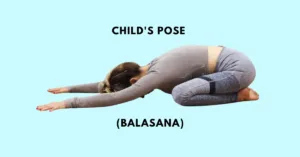
The child’s pose is one of the most calming poses in yoga. It helps quiet a busy mind and releases tension from your back and shoulders.
How to do it:
- Kneel on your mat with your big toes touching
- Sit back on your heels
- Spread your knees wide apart
- Bend forward and lay your chest between your thighs
- Rest your forehead on the floor
- Extend your arms out in front of you
- Take slow, deep breaths for 1-5 minutes
Tips:
- Put a cushion under your forehead if the floor feels too hard
- Keep your arms alongside your body if stretching them forward isn’t comfortable
- Focus on making your breaths long and steady
Mental health benefits:
- Calms anxiety
- Relieves mental fatigue
- Helps with headaches from stress
- Creates a feeling of safety and comfort
Cat-Cow Stretch (Marjaryasana-Bitilasana)
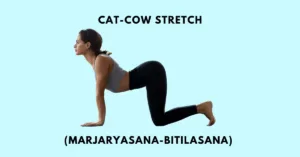
This gentle flowing movement between two poses helps release tension and connects your breath with movement.
How to do it:
- Start on your hands and knees
- Hold your wrists under your shoulders and knees underneath your hips
For Cow pose:
- Breathe in
- Drop your belly down
- Lift your chest and head
- Look up slightly
For Cat pose:
- Breathe out
- Round your spine up
- Drop your head
- Pull your belly button up
- Move slowly between these positions 5-10 times
Tips:
- Keep your movements slow and smooth
- Match each movement to your breath
- Don’t force your neck – keep it relaxed
Mental health benefits:
- Reduces anxiety and stress
- Improves focus and concentration
- Balances energy levels
- Helps clear your mind
Standing Forward Bend (Uttanasana)
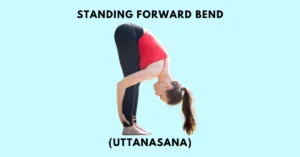
This pose helps calm your nervous system and gives your mind a break from racing thoughts.
How to do it:
- Stand with your feet hip-width apart
- Bend forward from your hips
- Let your head and arms hang down
- Bend your knees slightly if needed
- Let your head and neck relax completely
- Hold for 30 seconds to 2 minutes
Tips:
- Don’t lock your knees
- Bend your knees as much as needed to feel comfortable
- Let your head hang freely
- Don’t try to touch your toes – focus on relaxing
Mental health benefits:
- Calms the mind
- Reduces anxiety and stress
- Relieves mild depression
- Helps with sleep problems
Legs Up the Wall Pose (Viparita Karani)
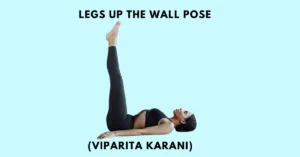
This gentle inversion pose is very calming and can help with anxiety and sleep problems.
How to do it:
- Sit sideways next to a wall
- Lie back and turn your legs up the wall
- Move your bottom close to the wall
- Let your arms rest at your sides
- Close your eyes
- Stay here for 5-15 minutes
Tips:
- Put a folded blanket under your lower back for comfort
- Keep your legs slightly bent if straight legs feel uncomfortable
- Try this pose before bed to help with sleep
Mental health benefits:
- Reduces anxiety
- Helps with insomnia
- Calms racing thoughts
- Relieves mild depression symptoms
- Reduces fatigue
Corpse Pose (Savasana)
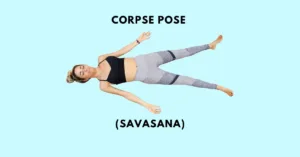
This final relaxation pose might look simple, but it’s one of the most powerful poses for mental health.
How to do it:
- Lie on your back
- Spread your feet slightly apart
- Let your arms relax at your sides, palms up
- Close your eyes
- Relax every part of your body
- Stay here for 5-15 minutes
Tips:
- Use a blanket to stay warm
- Put a small pillow under your head if needed
- If your lower back bothers you, put a cushion under your knees
Mental health benefits:
- Reduces stress and anxiety
- Helps with depression
- Improves sleep quality
- Calms racing thoughts
- Reduces mental and physical fatigue
Making These Poses Part of Your Daily Life
Incorporating these yoga poses into your daily routine is easy. Set aside just a few minutes each day to rehearse. You can do them in the morning to energize yourself or in the evening to relax. Consistency is key to enjoying the benefits of your mental health and well-being.
To get the most benefit from these poses:

Start Small:
- Try just one pose at first
- Practice for just 5-10 minutes
- Gradually add more poses and time
Be Regular:
- Try to rehearse at the exact time each day
- Even a few minutes daily is better than a long session once in a while
- Morning exercise can set a positive tone for the day
Listen to Your Body:
- Never force yourself into any pose
- Stop if something hurts
- Modify poses to fit your needs
Create a Calm Space:
- Find a quiet spot for your practice
- Keep your phone away
- Use comfortable clothes
Safety Notes
While these yoga poses are generally safe, please:
- Talk to your doctor before starting yoga if you have any health concerns
- Stop any pose that causes pain
- Don’t practice if you’re injured
- Be extra careful if you have high blood pressure or heart problems
- Don’t force yourself into any position
Remember that yoga is not a replacement for mental health treatment. If you’re dealing with serious mental health issues, please work with a mental health professional. Yoga can be a helpful addition to professional treatment.
These five poses offer a simple way to start using yoga for better mental health. Even practicing for a few minutes can help you feel calmer and more balanced. Start slowly, be patient with yourself, and notice how your mind and body feel as you make these poses part of your daily routine.
Conclusion
Incorporating yoga into your daily routine can be a powerful way to manage stress and improve mental health. The five poses mentioned are simple yet effective techniques to relax the mind, ease tension, and promote inner peace. Regular practice not only helps in reducing stress but also enhances focus, boosts mood, and improves overall well-being. Remember, even a few minutes of yoga each day can make a big difference. So, take a deep breath, find a quiet space, and allow yoga to guide you to a calmer, more balanced life.
FAQs
Q: Can yoga help with stress relief?
A: Yes, yoga can reduce stress by calming the mind and body. Breathing exercises and gentle poses help relax, lower anxiety, and bring a sense of peace and balance.
Q: How often should I do yoga to feel less stressed?
A: Practicing yoga even 10-15 minutes daily can be helpful. Consistency is key; regular practice brings better results in reducing stress and improving overall mental health.
Q: Can beginners try yoga for mental health?
A: Absolutely! Yoga is appropriate for all groups, including beginners. Start with simple poses and breathing exercises, and gradually build your practice to see calming and stress-relieving benefits.
Q: Do I need special equipment to do yoga?
A: No, you don’t need special equipment. A comfortable mat and a quiet space are enough to get started. Some may use cushions or straps for added support, but they are optional.
Q: Is yoga better than meditation for mental health?
A: Both yoga and meditation are beneficial. Yoga combines movement with breathing, which can release tension, while meditation focuses on stillness and mindfulness. You can choose one or do both together.
Also Read:
The Benefits of Meditation and Mindfulness
The Health Benefits of Yoga: A Complete Focus
References:
https://en.wikipedia.org/wiki/Yoga_as_therapy
https://www.researchgate.net/publication/316946652_Yoga_and_Mental_Health_A_Review
Disclaimer: This blog offers general information about yoga and mental health. It is not a substitute for professional medical advice. Always consult a healthcare provider before starting any new exercise routine, especially if you have health concerns.
Related post

7 Health Benefits of Assam Tea


